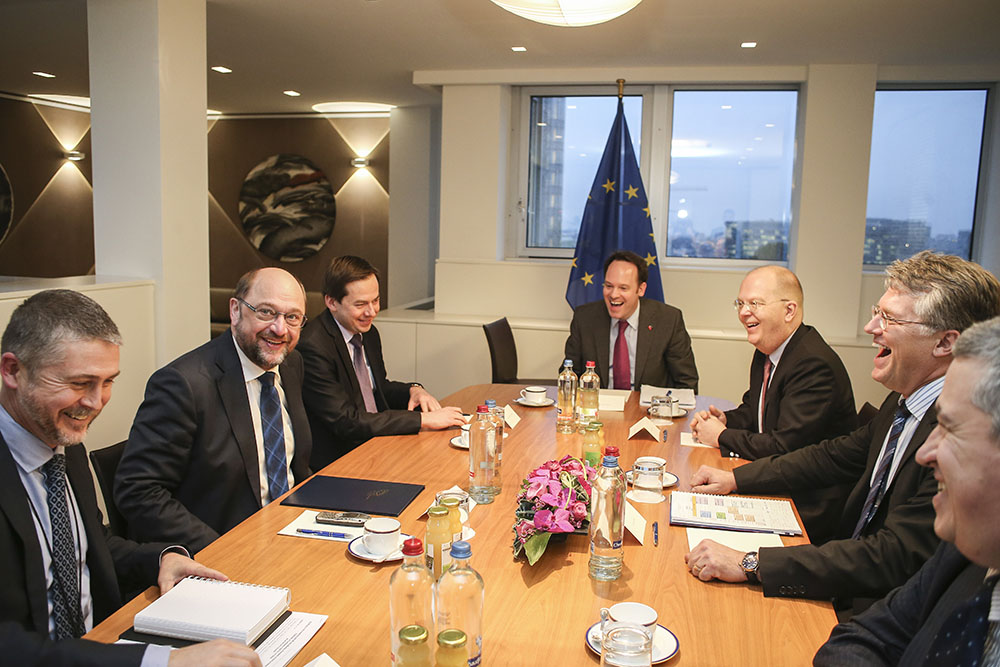 The European Chamber has developed our 2014–2017 Strategy Review, which promises improvements to our member services in a number of areas. As the first year of his second term comes to a close, President Jörg Wuttke met with EURObiz editor Carl Hayward to cast an eye over 2014 and outline what these improvements will be.
The European Chamber has developed our 2014–2017 Strategy Review, which promises improvements to our member services in a number of areas. As the first year of his second term comes to a close, President Jörg Wuttke met with EURObiz editor Carl Hayward to cast an eye over 2014 and outline what these improvements will be.
Having successfully steered the ship from 2007–2010, you’d be forgiven for thinking that Wuttke’s second Chamber presidency would be a breeze. Overall, he says, things have gone well but it hasn’t all been plain sailing. The Chamber is now a larger and more complex organisation and he compares the information overload he experienced upon returning to “drinking water from a hose.” It’s inevitable, then, that some things would go better than others.
So what worked, and what didn’t?
Despite a palpable increase in column inches in top-tier media in 2014, Wuttke feels media engagement is an area that can be improved on, which seems overly critical until he elaborates the point. Media communication from the top of the organisation has been successful but he’d hoped for more engagement from the local chapters and working groups. He attributes the reluctance to engage to a natural fear of media exposure among some member companies, which he understands.
“This is perhaps something I didn’t explain properly,” he concedes, “These [media] sessions I proposed would be off the record.” The idea being to impart an understanding of the issues the Chamber wants to discuss and gauge the appetite of journalists to pursue these stories. If there was an indication of media interest the Chamber could then launch a topic to try and influence public opinion. This level of media engagement is important, he says, because the Chamber needs to utilise all available channels in order to communicate important issues in a smarter way. “We can’t afford advertising to get our points across so we have to find other ways to talk to stakeholders,” he explains.
Among the successes of 2014—although published at the beginning of 2015—was the Shanghai Position Paper, which Wuttke describes as a “great leap forward”. He is also proud of the tenacity the Chamber displayed in government engagement. In particular he highlights the Chamber’s stance on the Anti-Monopoly Law (AML), which, although it generated some pushback, eventually resulted in a positive meeting with the National Development and Reform Commission (NDRC) in December and a follow-up workshop, for which Wuttke is extremely appreciative.
“There is a latent fear of taking on government agencies in public but I think if you’re fact-based you have all reason to speak up, particularly as the interests of the Chamber also cover the well-being of China’s economic structure. If you think there is something to be improved then you should speak out,” he says.
A further highlight of 2014 was the development of the Chamber’s Strategy Review to 2017 (Strategy Review), and it is this that takes up the remainder of our discussion. “It’s very important to set out our thoughts on what we want to achieve – and perhaps even more important, what we don’t want to do. We must sharpen our focus,” says Wuttke.
Content, content, content
A key part of the Strategy Review is increased and improved content. Since the Chamber’s formation the Position Paper has been the standard bearer for Chamber content and is the reason the Chamber is recognised as the leading, independent voice for European business in China. The local chapter papers have historically been consigned to the back of the Position Paper, with just a few hundred words dedicated to them. It was increasingly apparent though that for a country the size of China this approach wasn’t working. Wuttke draws parallels between China and the European Union (EU), as both being “continents with member states.” It became clear that “the member states of South China and Southwest China have issues that are completely irrelevant to Shenyang and Tianjin.” This led to the birth of the local chapter position papers.
These local papers will facilitate greater engagement with local government and media, and it is through these channels that the Chamber can advocate members’ issues more effectively. “If you’re in Chongqing or Chengdu, it’s more likely to be local issues that concern you as a member,” explains Wuttke. “If we as a Chamber are not speaking to the local government about these issues through the media or giving them regular annual feedback why should they reach out to us or change things?”
Increased media coverage
When he ran for president in 2014, one of Wuttke’s nine election points was the intention to reach out to the ‘big five’—Reuters, Bloomberg, Financial Times, The Economist and the New York Times, as well as the Wall Street Journal and the Washington Post—and gain more media coverage. Although they’re mostly US-based papers these are the ones that get translated into Chinese and read at the highest level and they shape public opinion. So far Wuttke feels this media strategy has worked well, with the Chamber hitting the right points, selecting the right topics and remaining relevant without descending into China-bashing. “There’s a kind of perception that the media is very negative towards China, so if we don’t speak up and add our voice to the chorus, how can we change this perception?” he asks. “We need to acknowledge that China is actually struggling with certain problems, but at the same time we need to speak up and give our recommendations, too.”
There is at the same time, Wuttke says, a prevailing opinion among a large section of the European business community that we should be ‘nice’ to the Chinese Government. This approach would be as much a mistake as China-bashing. The focus should be on being relevant and honest, instead. Of course there has to be an acknowledgement of the system we are operating in, and there is no sense in making rousing points for the sake of garnering reaction, or shouting into a vacuum and getting no response at all. There needs to be a focus on the matters that mean the most to members, whether it’s the AML, taxation or the Environmental Protection Law.
Speaking out in the media is only around five per cent of the engagement the Chamber has with stakeholders – 95 per cent is behind closed doors with the specialists, discussing the content papers with Chinese and European authorities. But it is a crucial part of stakeholder engagement, explains Wuttke. “We’re in a different league now, but there is still a lot to be done. Priority number one is for the local chapters and chairs to start servicing the media in all of the regions where we have a presence.”
Expanding our reach
For many years the Chamber has been lobbying State Council ministries, but much of the power traditionally held by them has now shifted elsewhere. China’s political landscape has become more complex and the Strategy Review takes this into account. Lobbying the ‘normal’ State Council ministries—the Ministry of Industry of Information and Technology, the Ministry of Commerce, the NDRC and others—will remain the Chamber’s bread and butter. But there will be an increased focus on think tanks over the coming years. Think tanks are incubators of new ideas and are often catalysts for possible policy changes – these are the places where you find people whose job it is to test new ideas and, as Wuttke points out, “what else does the Chamber do but make recommendations and bring new ideas to the Chinese leadership?”
These days, advocacy efforts need to be increasingly sophisticated and multi-layered. It is not possible to approach a silo, a single ministry, and advocate your case anymore. “These silos are not isolated, unrelated to other entities, they are part of bigger system and the party, and they’re part of the legislative process with the National People’s Congress,” says Wuttke, “So it is important to reach out to the party, parliament, ministries and think tanks, as well as local governments.”
Better engagement with Europe
This same multi-layered advocacy approach will be adopted in Europe, too. While the commissioners and the commission itself remain important, there is also the parliament to consider. It became something of a powerhouse after the elections last May – they weren’t previously in charge of making decisions on the market economy status or stages of trade agreements, for example. At the same time, member states’ governments also have a tremendous influence on how China is dealt with so the Chamber needs to maintain channels of communication there as well.
“The big challenge is knowing who the new political masters are, and what their level of awareness about China is, and then judging how we rank among the whole cacophony of matters that they are currently confronted by,” says Wuttke. He points to the current volatile situation in Europe—the civil war in Ukraine, emotional discussions on the Transatlantic Trade and Investment Partnership (TTIP), Muslim extremism in some European cities—and expresses some surprise that China still matters a great deal. “Given these challenges, it speaks volumes that the president of the EU parliament received us on our recent tour of Europe,” he says.
The Chamber has already established a man on the ground in Brussels—Serge Janssens—who will help to connect the Chamber more effectively with Europe. As a former president of the Chamber Janssens is dedicated to the cause and will help to facilitate a better flow of information.
Increasing our footprint
Another part of the Strategy Review is for the Chamber to grow its capability to speak for China as a whole region. This could entail opening new chapters but Wuttke says that this would have to be done in a structured way if it is to be meaningful. It could not be realised in a city that doesn’t have a strong network of 50 or more European companies, for example. There are possibilities in cities such as Xiamen, Qingdao and Dalian but Wuttke exercises caution here. “We have made it clear we are sympathetic towards this but we’re not going to do it for the sake of putting ourselves on the map – we’re already on the map.” He continues, “What we need to do is secure solid content from our existing local chapters and get them to speak up. Once we have achieved this other non-Chamber areas will understand what would be expected of them if they were to come on board. We aren’t just a networking club.
Stepping up to the plate
It is the list of “unfinished business” that has galvanised Wuttke’s decision to run for president again in April 2015. He has a strong desire to see how the local chapter’s position papers take root and flourish and to see how they work once data from the Chamber’s Business Confidence Survey has been woven into them. By rising to the challenge and producing high-quality papers the local chapters will really add to the Chamber’s credibility and help to realise the goal of speaking authoritatively for the China as a whole, not just the capital. This fits with Wuttke’s overall vision for the Chamber to continue to improve all of its service offerings to its members:
“The danger I see, and this is maybe partly why I decided to run again in 2014, is that the Chamber should not become complacent. Once members’ engagement levels start to drop all of a sudden there is a new dynamic and to turn that around is very, very difficult. So I felt strongly that the Chamber has more potential when I took this on again last year and I still see that I definitely want to have one more term to see a couple of developments through.”





Recent Comments